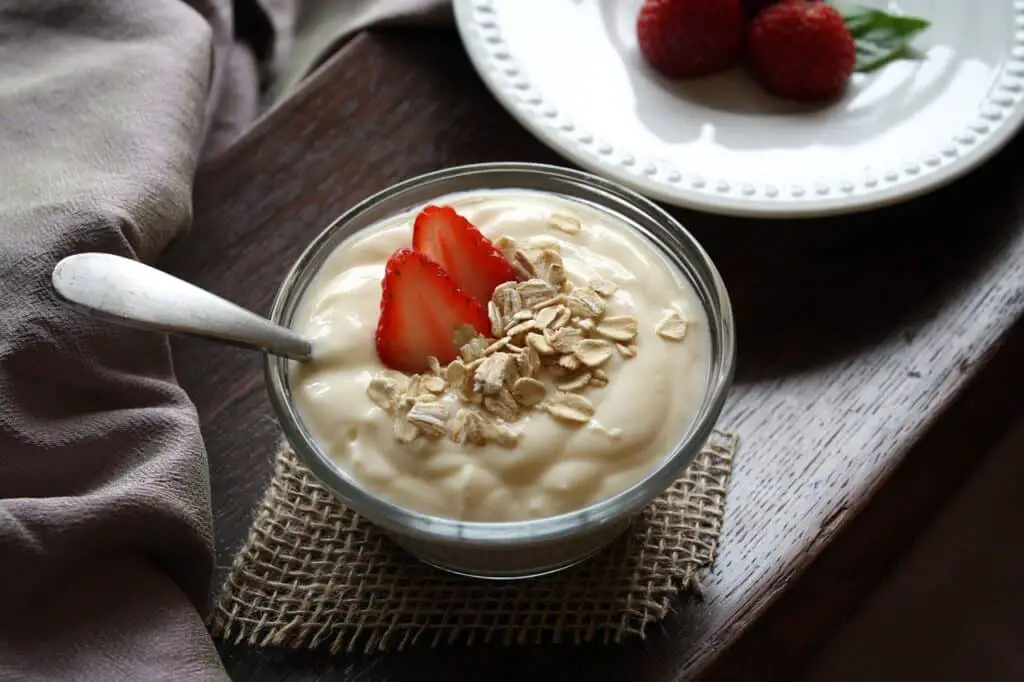Nothing is quite delicious as a cup of creamy, thick vanilla yogurt.
While you might enjoy it as a quick snack or light breakfast, the thought might have crossed your mind: can dogs have vanilla yogurt?
Well, you are not alone.
Many pet parents wonder if they can share their favorite yogurt with their furry friends, and we are here to set the record straight.
So, can dogs have vanilla yogurt?
Yes.
Vanilla yogurt given as an occasional treat to your dog will cause no harm.
Ensure the yogurt doesn’t contain any artificial sweeteners like xylitol and be sure to watch out for any adverse reaction in your dog.
Moderation is vital when it comes to vanilla yogurt.
We’ve compiled important information on the benefits, risks, and alternative yogurt to try as a treat for your canine friend.
It’s generally safe for dogs to eat vanilla yogurt, but there are exceptions you should know before letting your furry friend eat some.

Health benefits of vanilla yogurt for dogs
Proper bone development
Vanilla yogurt has high calcium levels, which will aid in the proper bone development of your dog.
It also contributes to healthy teeth maintenance in dogs, proper muscle growth and function, a strong heart, and maintains the nervous system.
Tissue repair
The protein found in vanilla yogurt has essential amino acids which contribute to your dog’s tissue repair.
Protein is also necessary for your dog’s muscle development, improved skin, and a healthy and shiny coat.
It also facilitates metabolism in dogs aiding in weight loss.
Aids in gut health
Vanilla yogurt has probiotics, which are necessary for a weakened immune system.
Processed meals, consumption of certain human foods, and medications will weaken your dog’s immune system.
Probiotics increase the good bacteria in your dog’s gut aiding in weight loss, improved digestion, healthy skin and coat, immune system function, and reduced risk of diseases and cancer.
Probiotics also fight the yeast that causes conditions like ear infections, hot spots, and constant itchiness in dogs.
Protects against tooth decay
Vanilla yogurt has whey which contains casein peptides that demineralize the plaque and tartar on your dog’s teeth.
They also neutralize the bacteria that cause decay.

Health concerns of serving vanilla yogurt to your dog
Lactose intolerance
Your dog can lack the lactase digestive enzyme needed to break down the lactose in vanilla yogurt.
A lack of this enzyme will make your dog lactose intolerant and will cause stomach upset every time your dog eats vanilla yogurt.
Symptoms of lactose intolerance in dogs include vomiting, lack of appetite, diarrhea, gas, and bloating.
Allergic reaction
Your dog can be allergic to dairy products.
Consumption of vanilla yogurt will lead to an allergic reaction with symptoms such as red itchy skin, rashes, diarrhea, vomiting, lack of appetite, hives, and breathing difficulties in severe cases.
Constantly monitor your dog closely for any signs of an allergic reaction.
Weight gain
Vanilla yogurt has a high-fat content that can lead to weight gain in your dog.
Weight gain will lead to heart diseases, respiratory issues, joint problems, pancreatitis, and lethargy.
If you are concerned about your dog’s weight, portion control will be critical for this yogurt.
Added sugar
Vanilla yogurt has a lot of added sugar which your dog’s digestive system can’t process.
The high amount of added sugar in your dog’s system will lead to diabetes, dental problems, and weight gain.
Toxic flavors
Some vanilla yogurt contains xylitol, an artificial sweetener, which is toxic to dogs even in small amounts.
Xylitol causes hypoglycemia (drop in blood sugar) which will be life-threatening to your dog.
It can also cause seizures and liver failure.
Signs of xylitol poisoning in dogs include decreased activity, vomiting, weakness, staggering, and seizures.
Simple vanilla yogurt recipe for dogs
Ingredients
- 1 cup vanilla yogurt
- 15 diced strawberries
- 20 blueberries
Instructions
- Step 1: Place the blueberries and strawberries on an ice cube tray.
- Step 2: Pour the vanilla yogurt on the berries and smoothen it over. Ensure there are no air bubbles and the mixture is evenly distributed.
- Step 3: Freeze for a minimum of 5 hours. Once done, serve as treats in moderation.
How much vanilla yogurt is enough for my dog?
Vanilla yogurt should be offered as an occasional treat to your dog.
Follow the 90/10 rule for treats.
Ninety percent of your dog’s daily calories should come from a well-balanced meal, and the remaining 10 percent of calories should come from treats.
A higher portion of vanilla yogurt treat will put your dog at risk of diabetes and obesity.
You can also add some fruits to the vanilla yogurt for an added health kick.
What to do if your dog overate vanilla yogurt
First, figure out the type of vanilla yogurt they ate.
There’s no need to panic if the vanilla yogurt doesn’t contain any harmful ingredients.
If your dog is lactose intolerant, it may experience stomach upset and gas, which will fade after a few potty visits.
It will be a serious situation if your dog eats vanilla yogurt containing xylitol or chocolate.
If this happens, contact your vet to determine the next step of action.
Try first aid to eliminate the poison as you head to the vet.
Alternative to vanilla yogurt for dogs
Greek yogurt
Plain Greek yogurt will be the healthiest alternative yogurt for your dog.
It is creamier, thicker, and contains more proteins and fats than regular yogurt.
Greek yogurt also has fewer sugar and carbs than regular yogurt.
The yogurt’s thickness and high protein will make your dog feel fuller for more extended periods and aid in weight loss.
Tips to consider when feeding your vanilla yogurt
- Ensure you read the ingredient label of the vanilla yogurt. Avoid the ones with artificial ingredients, sweeteners, and too much added sugar.
- Vanilla yogurt will add nutritional value to your dog’s diet as a treat. Start small and increase the portion gradually according to your dog’s reaction.
- Pick a vanilla yogurt with low-fat content.
- Moderation is key. Don’t feed your dog too much vanilla yogurt – a whole bowl is a bad idea as it can cause stomach upsets.
- If your dog is lactose intolerant, don’t feed it vanilla yogurt.
- Contact your vet in case of xylitol poisoning, or an allergic reaction occurs.
Frequently asked questions (FAQs)
Can dogs eat plain yogurt?
Yes, dogs can eat plain yogurt as it is packed with probiotics, calcium, and protein to support your dog’s health.
Ensure it doesn’t contain any artificial or natural added sweeteners.
Can dogs eat vanilla yogurt daily?
No, dogs cannot eat vanilla yogurt daily because of its high-fat content and added sugars.
These ingredients will be harmful to your dog when eaten regularly.
To wrap up
You can share vanilla yogurt with your dog, depending on its ingredients.
It will be a good source of protein, calcium, and probiotics which will boost your dog’s immune system.
Avoid vanilla yogurt with xylitol and high added sugars.
Try adding an assortment of fruits to the vanilla yogurt to ensure a healthier and happier dog.
- What Dog Breeds Have Pink Skin? - March 24, 2023
- What Are the Most Inspiring Dog Breeding Quotes? - March 20, 2023
- Can Pheromone Spray Help Improve Dog Breeding Results? - March 19, 2023








